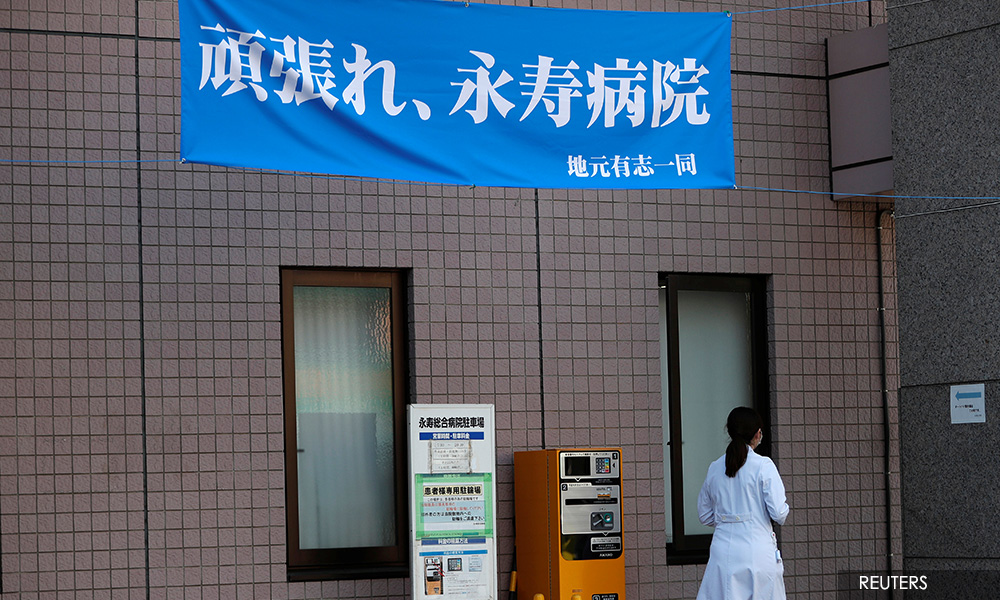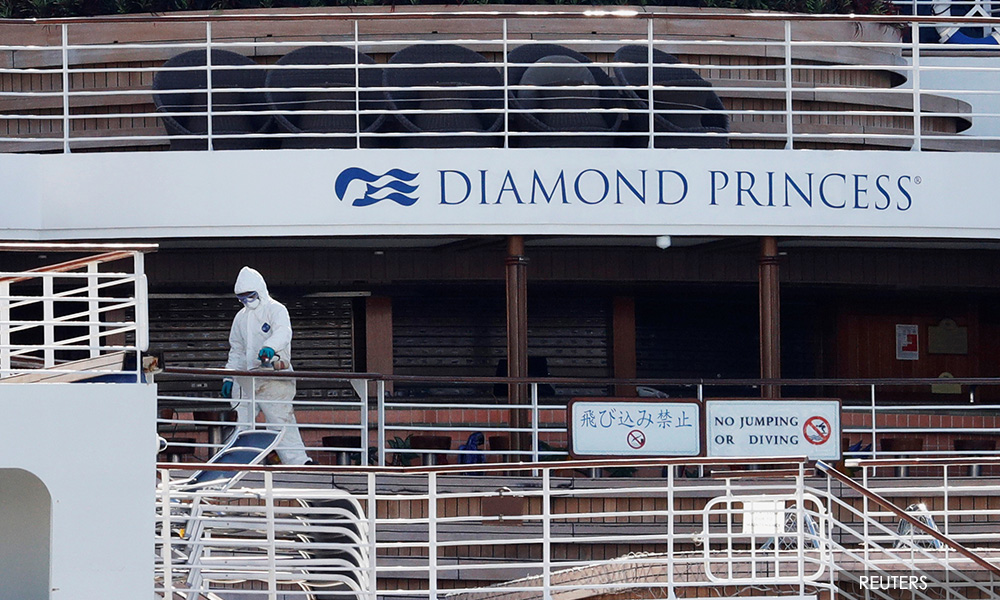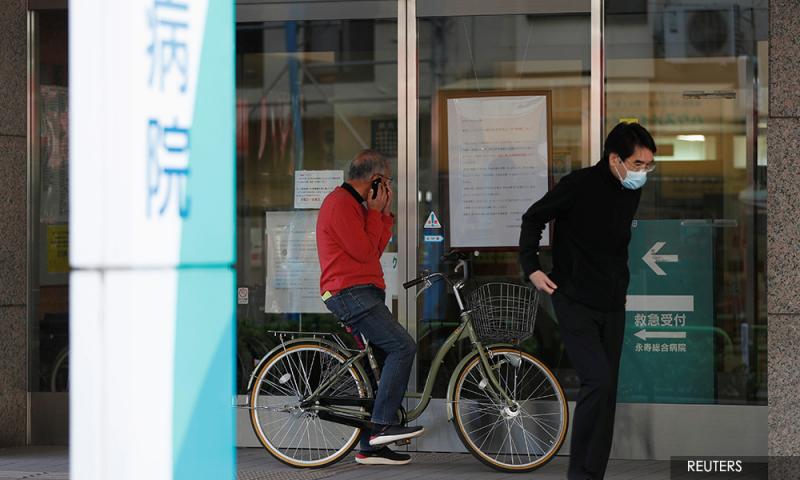Running out of beds, Tokyo health staff say 'state of emergency' already here
CORONAVIRUS | As Japan faces a fresh wave of coronavirus infections and the government prepares for a state of emergency, medical staff say a shortage of beds and a rise in cases linked to hospitals are pushing Tokyo's medical system to the brink of collapse.
The crisis has already arrived at Eiju General Hospital, a pink, 10-storey building in central Tokyo, which has reported 140 cases of Covid-19 in the past two weeks. Of those, at least 44 are doctors, nurses and other medical staff.
On a recent weekday, the glass doors of Eiju General were plastered with posters saying the hospital was closed until further notice.
More than 60 patients with the virus are still being treated inside. One person who was transferred to another hospital infected others, according to health officials in Tokyo's Taito ward.
Japan has only a small fraction of the number of cases reported by its neighbours China and South Korea. Yet scenarios similar to that at Eiju General are playing out across Tokyo, as a dozen doctors and nurses in the city told Reuters there is a shortage of gear and staff even as infections surge.
"We could empty out an entire ward and use it just for corona patients, but that means those patients (with other illnesses) will have to go elsewhere," said a doctor specialising in infectious diseases at a major hospital in the greater Tokyo area. "If we can't do that, it will lead to the virus spreading all through the hospital and lead to a collapse of our medical system."
Official data tell a similar story. Tokyo's government said that as of Sunday, 951 people with Covid-19 were hospitalised; in a live YouTube address Sunday night, Tokyo governor Yuriko Koike said there were about 1,000 beds allocated for coronavirus patients in the city.
Even as other countries have locked down borders and ramped up testing, Japan appeared to have side-stepped the kind of mass infections seen elsewhere - an effect some experts say was mostly due to a lack of testing. In the early stages of the epidemic, Japan was also weighing whether to postpone the Summer Olympics, a decision that eventually came in late March.
Since mid-January, Japan has tested 39,446 people, while the United Kingdom has tested 173,784 and South Korea has conducted 443,273 tests, according to data from Oxford University.

Authorities have tried to test and track in a way that avoided overwhelming Japan's hospitals, said Hitoshi Oshitani, an infectious disease specialist on the government panel shaping the country's coronavirus policy.
Despite that, the total number of positive cases nationwide nearly doubled in the last seven days to 3,654. Tokyo is now the largest hub for Covid-19 in Japan, with more than 1,000 confirmed cases.
With cases surging, officials said, some who tested positive have had to briefly wait at home or in outpatient sections of hospitals until beds became available. Koike said on Sunday that to ease the burden on medical staff, Tokyo would transfer people with mild symptoms into hotels and other accommodations starting Tuesday.
Hiroshi Nishiura, a Hokkaido University professor and member of a panel advising the government on its coronavirus response, said Eiju General, like many Tokyo hospitals, has no infectious disease department. That meant coronavirus patients were initially treated alongside everyone else, allowing the virus to spread.
"We have not been able to clearly contain the contagion from the first wave," Nishiura said, referring to Eiju General. A spokesman from the hospital declined to comment on Monday.
On Friday, another hospital in Tokyo said three nurses and one doctor had been infected while treating patients. The next day, Tokyo saw its daily coronavirus cases top 100 for the first time, and on Sunday 143 people tested positive.
A representative for the Tokyo government said Monday that "the medical system remains secure," adding that Tokyo was continuing to urge residents to avoid all unnecessary outings.
Scramble for beds
Contagion is an enormous risk in dense Tokyo, a city of nearly 14 million people. Japan also has one of world's oldest populations, with nearly a third of the country - 36 million people - older than 65.
According to Japan's health ministry, there are some 1.5 million hospital beds nationwide, but beds in negative-pressure rooms reserved for infectious diseases excluding tuberculosis have dwindled to just 1,882, with only 145 in Tokyo.
Though people with Covid-19 do not all need such rooms, they still must be kept apart from other patients.
In recent days, Tokyo officials have been scrambling to secure 4,000 beds for coronavirus patients, asking hospitals to free up space in ordinary wards and even offering financial incentives, said one city official with direct knowledge of the planning. He declined to be named as he was not authorised to speak to media.
"There isn't that much capacity (of hospital beds) left in Tokyo, so a (medical collapse) is no longer unforeseeable," said Satoshi Kamayachi, an executive board member of the Japan Medical Association, which has pushed Japan to call for a state of emergency. "The number of patients is clearly rising, so the situation is becoming more urgent."
Japan's response
Even after Japan drew fire for how it handled patients on the cruise ship Diamond Princess, it did little to step up testing and preparations, some critics say.

Tokyo assemblyman Akihiro Suzuki wrote to Koike on Jan. 31, asking her to set up a medical and consultation system for coronavirus cases.
"The response was slow and even now it's (too) slow," he said. Suzuki has submitted 10 requests since then asking for a range of measures, from procuring more ventilators to clarifying Tokyo's policy on treating critical patients.
A representative for the Tokyo metropolitan government said the city had been preparing "specific medical measures" since March 23 for a possible increase in cases, including securing more beds.
A half-dozen nurses working at clinics and mid-sized Tokyo hospitals said that they had been told to reuse masks and were concerned about having enough staff to deal with a surge. Several doctors said they had been told not to discuss the capacity of their hospitals with the media.
Nurses told Reuters they were not sure whether their hospitals had enough advanced personal protective equipment like N95 masks and plastic gowns.
"The other day I saw a news report that a nurse wearing a trash bag as protective gear died in New York and I wondered if that'll be me in the future," one nurse in her 30s told Reuters. Like many other medical workers, she declined to be named because she is not allowed to speak to the media.
Kasumi Matsuda, who works for the Japan Federation of Medical Workers' Unions and was a nurse for 13 years, said many of its 170,000 members had also reported a lack of protective gear.
"I think the system is already beginning to fall apart," she said.
As the number of cases rises in Tokyo, the Japan Medical Association and Tokyo governor Koike have asked the central government to quickly declare a state of emergency to reduce the rate of infections.
Such a declaration empowers governors to close public facilities and "name and shame" companies that refuse official requests. But it cannot force companies to comply.
Media reports on Monday indicated that Prime Minister Shinzo Abe was preparing to declare a state of emergency this week after days of saying such a decision would be premature.
On Friday, a non-profit organisation that offers developmental aid abroad, said it would build a makeshift hospital with 1,200 beds by the end of April in a bayside shopping district of Tokyo.
The beds will be set up under tents in a parking lot of a museum of maritime science, a building shaped like a docked ship.
- Reuters
Keep up with the latest information on the outbreak in the country with Malaysiakini's free Covid-19 tracker.
Malaysiakini is providing free access to the most important updates on the coronavirus pandemic. You can find them here.
Help keep independent media alive - subscribe to Malaysiakini.
RM12.50 / month
- Unlimited access to award-winning journalism
- Comment and share your opinions on all our articles
- Gift interesting stories to your friends
- Tax deductable

 Reuters
Reuters